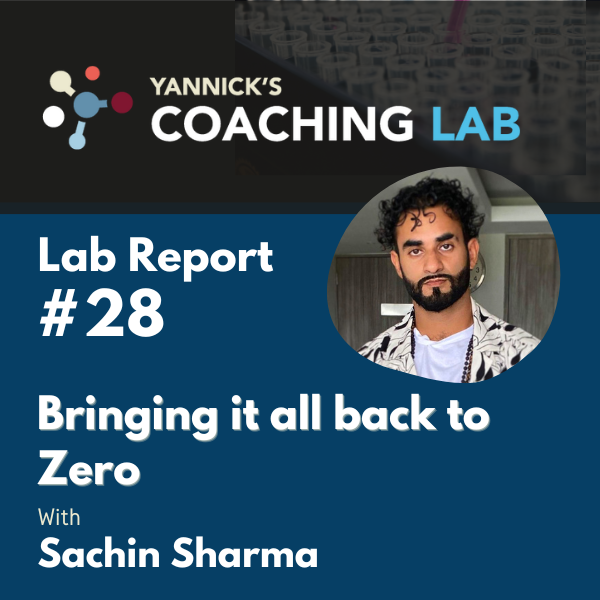
I don’t think I’ve ever had more fun watching a coaching session than during our last Lab. We’ve also witnessed how important it can be to match our clients to our approach when we work in a particular way – and Sachin’s approach to coaching is definitely “particular”! 🙂
Curious to know more? Have a peek at this month’s Lab Report below or consider membership to access the recording of this and many more exciting coaching sessions (including a 45min debrief and Q&A with coach and client).
Yannick’s Coaching Lab #28 —Sachin Sharma
Lab Report by Daniel Lev Shkolnik
Summary
Sachin Sharma is a successful UK-based life and business coach. He hosts the popular Spoon of Consciousness podcast and has been a guest on various other podcasts. He trained as a coach at Animas Center for Coaching but ultimately his coaching developed in a different direction. His coachee, Tinati, is herself a coach, and she wanted to work on her anxiety about the future, which the pandemic worsened. She felt unable to return to the level of calm that she had felt pre-pandemic.
Key Insights
“Using an iPhone to Eat a Salad” – Sachin offered Tanati many colorful and fun analogies such as “you wouldn’t use an iPhone to eat a salad,” trying to drive home the point that the rational mind is a versatile tool—but it isn’t good for everything. Or “if there’s a chicken in your house, don’t chase it, let it wander out”—referring to a strategy of letting anxious thoughts find their own way out, instead of fixating on getting rid of them. He could have simply explained these concepts, or used a well-worn idioms to get his point across, yet the vibrancy of the language and imagery made the concept instantly stand out and more readily stick in the mind. It also brought an added level of levity and humor to the session which seemed to improve rapport.
“What if there’s nothing to ‘handle?’” – After asking for and receiving permission to challenge Tanati’s beliefs, Sachin quickly offered an alternative perspective for Tanati to consider: what if her anxieties about the future were not a problem at all? This was a theme Sachin returned to multiple times in the session, rephrasing it with analogies such as: “when it rains, do you do anything about it raining?” The implication is reminiscent of a Buddhist or Taoist perspective that troubling thoughts will dissipate of their own accord, which was one example of the way Sachin brought spiritual concepts into the coaching session.
Driving at a Single Thesis – From the start, Tanati did not really accept Sachin’s thesis that there was “nothing to handle.” Instead of switching to a different strategy, Sachin attempted different analogies to try and open his client to a different perspective which he believed would help her move forward. However, it seemed that Tanati had reservations about this way of thinking about her anxieties. As a result, subtle tension built during the session. By the end, Tanati had still not accepted Sachin’s basic premise, though because Sachin was able to maintain good rapport, she said she enjoyed the session.
Capital-T Truth – There was a lively discussion after the session about the value of bringing the coach’s personal beliefs into the session. Sachin said he believes there exist certain Truths (with a capital T), which inform the way he coaches. However, if a client rejects this worldview or don’t find it helpful after considering it, as did Tanati and several other coaches in the Lab, they’d usually not end up to be his clients. Picking the right clients for your coaching approach seemed very important when coaching in this way.
Bringing all of Yourself to the Session – Sachin brought a lot of himself to this session: his beliefs, personality, even an explanation of his favorite linguistic expressions. This made for a vibrant and entertaining session in which Sachin talked as much if not more than the coachee. Yet it also meant that a lot depended on whether Sachin’s coachee aligned with his worldview and character.
Thinking about Thinking – Although Sachin provided many interesting analogies, he seemed to stay on the level of thought throughout the session. Sachin’s approach may have worked with another client, but in Tanati’s case, she did not agree with Sachin’s core thesis on a rational level. The observers were left wondering what might have happened if they had started exploring emotions or the lived experience around her anxiety.
Takeaways
Sachin is very charismatic, entertaining, and engaging. He brought himself fully to the session, was able to establish a good rapport with his coachee, and it was clear how committed he was to his client’s wellbeing and success. His coaching style seems to rely on a high level of alignment with the coachee around beliefs and personal chemistry. Since the client-practitioner relationship tends to be the most impactful mediator for success, Sachin’s ability to create positive and compassionate relationships with clients may be one of the most powerful ways he effects change in their lives.
Watch the recording of this session and debrief by becoming a member: https://bit.ly/CoachingLabMembership
The complete vault of recordings can be found at https://bit.ly/LabRecordings
Many more exciting Labs are on the horizon: https://bit.ly/FutureCoachingLabs

